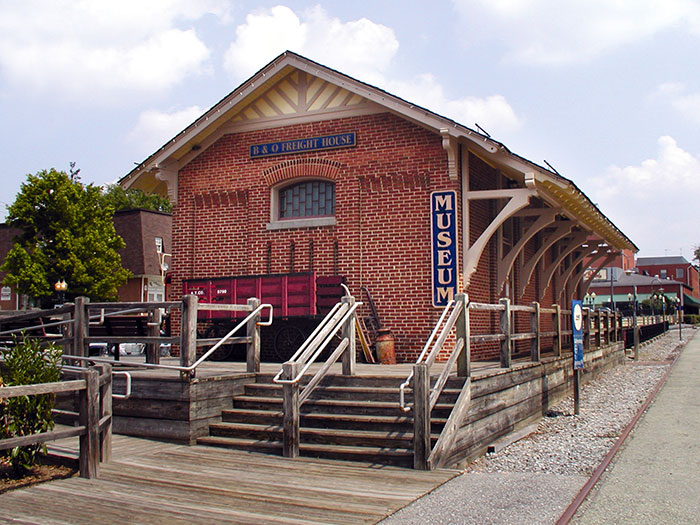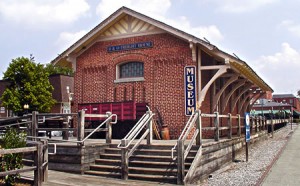
Explore Local History Through Gaithersburg’s “Tuesday Topics” Lecture Series
Gaithersburg continues it’s “Tuesday Topics” lecture series designed to explore local history on the second Tuesday of each month at the Community Museum. The Museum is located in the restored 1884 B&O Railroad Station at 9 South Summit Avenue. The cost is $5 per session.
Tuesday Topics sessions include:
Differing Historical Perspectives on Slavery in Maryland and the District of Columbia -January 13
Speaker: James H. Johnston, Historian and Author
Slavery in the Washington area was different than that in the Deep South right before the Civil War. While it began the same – in the late 1600s, Ninian Beall’s tobacco plantation occupied the land where the White House is today – it soon changed. After tobacco wore out the land, slavery made less sense, and it was hard to enforce with an increasingly diverse capital of the United States. By the time of the Civil War, Washington, D.C. still had slaves, but they lived among a population of free African Americans. Author James H. Johnston discusses the differing perspectives on slavery that emerge from his two books, The Recollections of Margaret Loughborough, about a daughter of the Old Dominion of Virginia, and From Slave Ship to Harvard, which follows six generations of an African American family in Maryland.
Maryland’s Wild Acres – February 10
Speaker: Kerry Wixted, Maryland Wildlife and Heritage Service, Department of Natural Resources
Maryland’s Wild Acres is a voluntary program encouraging Maryland citizens to create backyard wildlife habitats, which can include decks, yards, large lots, and everything in between. Such habitats can increase food and shelter for wildlife, control soil erosion, reduce sediment in waterways, conserve water, improve water quality, inspire stewardship, and beautify the landscape. The goal of the Wild Acres program is to create backyard habitats across the state that maximize wildlife benefits and highlight conservation stewardship.
From Corn to Commuters: How the Coming of the Railroad Changed the Way of Life and the Future of Montgomery County – March 10
Speaker: Susan Soderberg, Historian and Author
The coming of the railroad changed the face of Montgomery County forever. Featured are the railroad stations designed by Francis Baldwin, extraordinary feats of engineering such as the curving trestle over Little Seneca Creek and the Bollman Truss viaduct over the Monocacy River, and new suburban and agricultural towns spawned by this catapult into the Industrial Age. The talk, based on Susan’s book, The Met: A History of the Metropolitan Branch of the B&O Railroad, published in 1998 by the Germantown Historical Society, explores how this branch line became the mainstay of the B&O Railroad and evolved into the current commuter and freight line.
Turfgrass Management for Homeowners – April 14
Speaker: Stephen Dubik, Instructor, Montgomery College, Landscape Technology and Coordinator, Master Gardener Program, Extension Service
Before it became part of Bohrer Park, Summit Hall Farm was a leading grower of turfgrasses and turf seed in the country. In fact, Summit Hall Grass can be found everywhere, including the lawns of the White House, Washington Monument and Arlington National Cemetery. As a natural extension of that history, Stephen Dubik will talk about turf management for homeowners, focusing on mowing, irrigation and fertilization, as well as types of turfgrass species, insects and seed mixtures.
Mark Twain in Washington, D.C. – May 12
Speaker: John Muller, Washingtoniana Division, Martin Luther King Jr. Memorial Library
Eighteen-year-old journalist Samuel Clemens’s first dispatch from Washington, D.C. was composed in February 1854. He would return to the city after the Civil War as “Mark Twain,” a Westerner on the make as secretary to a Nevada Senator. With other newspapermen, including George Alfred Townsend, Twain formed the informal ‘Washington Syndicate,’ which wired news from the capital city all across the country. While in Washington he received his first book contract to write The Innocents Abroad, a collection of essays, and in 1873 he published his first novel, The Gilded Age, which took the city to task. On one of his last visits in 1906, Twain testified about protecting the integrity of his work with a new copyright law.
Museum After Hours with Blanche Fulks Severance – June 9
Speaker: Leigh Jameson, Colonial Williamsburg
Grounded in Gaithersburg History, actress Leigh Jameson brings the character of Blanche Fulks Severance (1874-1954) to life. Enjoy a relaxing evening of refreshments and lively interactions as Blanche shares her view of Gaithersburg history.


Engage us on Facebook
Follow us on Twitter
Tweets by @mymcmedia